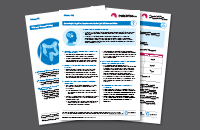 Full Guidelines
Full Guidelines
Click here to view article

 Tools
Tools


 Additional Documents
Additional Documents
Click here to see additional documents

The CTFPHC released the “Recommendations for growth monitoring, and prevention and management of overweight and obesity in children and youth in primary care” in 2015.
The task force recognizes that this guideline is currently out-of-date and has made a decision to “sunset” (archive) these recommendations. This was based on a review of the current evidence following the https://canadiantaskforce.ca/methods/updating-reaffirmation-and-sunsetting-clinical-practice-guidelines-methods-from-the-canadian-task-force-on-preventive-health-care/ methodology.
The decision to sunset the guideline was due to the following changes:
- The evolving concept of obesity as a health issue (e.g., risk factor vs chronic disease or disorder) and resultant impact on selecting appropriate health outcomes
- Substantial development in obesity management including pharmaceutical interventions that are beyond the scope of the Task Force mandate on preventive health care
- Anticipated availability of an upcoming comprehensive Canadian guideline on obesity in children and youth
The task force acknowledges the importance of this topic to the health and wellbeing of Canadians. During future topic selection, we may re-evaluate aspects of this topic that are better suited to the Task Force mandate.
Summary of recommendations for clinicians and policy-makers
Recommendations
The growth monitoring recommendations apply to all children and youth 0–17 years of age who present to primary care.
- We recommend growth monitoring at all appropriate primary care visits using the 2014 WHO Growth Charts for Canada.(Strong recommendation; very low quality evidence)The prevention recommendations apply to all children and youth 0–17 years of age who have a healthy weight. They do not apply to children and youth with eating disorders, or who are underweight, overweight, or obese.
- We recommend that primary care practitioners not routinely offer structured interventions aimed at preventing overweight and obesity in healthy weight children and youth.(Weak recommendation; very low quality evidence)The management recommendations apply to children and youth 2–17 years of age who are overweight or obese. Children and youth with health conditions where weight management is inappropriate are excluded.
- For children and youth aged 2 to 17 years who are overweight or obese, we recommend that primary care practitioners offer or refer to structured behavioural interventions aimed at healthy weight management.
(Weak recommendation; moderate quality evidence) - For children and youth aged 2 to 11 years who are overweight or obese, we recommend that primary care practitioners not offer Orlistat aimed at healthy weight management.
(Strong recommendation; very low quality evidence) - For children and youth aged 12 to 17 years who are overweight or obese, we recommend that primary care practitioners not routinely offer Orlistat aimed at healthy weight management.
(Weak recommendation; moderate quality evidence) - For children and youth aged 2 to 17 years who are overweight or obese, we recommend that primary care practitioners not routinely refer for surgical interventions.
(Strong recommendation; very low quality evidence)
- For children and youth aged 2 to 17 years who are overweight or obese, we recommend that primary care practitioners offer or refer to structured behavioural interventions aimed at healthy weight management.
Continuing Medical Eduation
Additional Documents
- Clinician Summary
- Protocol (pdf)
- Prevention Systematic Review (pdf)
- Treatment Systematic Review (pdf)
- Published Systematic Reviews
- Prevention List of Excluded Studies (pdf)
- Treatment List of Excluded Studies (pdf)
- Additional Resources
- CMAJ Author Podcast
- Guideline Presentation



